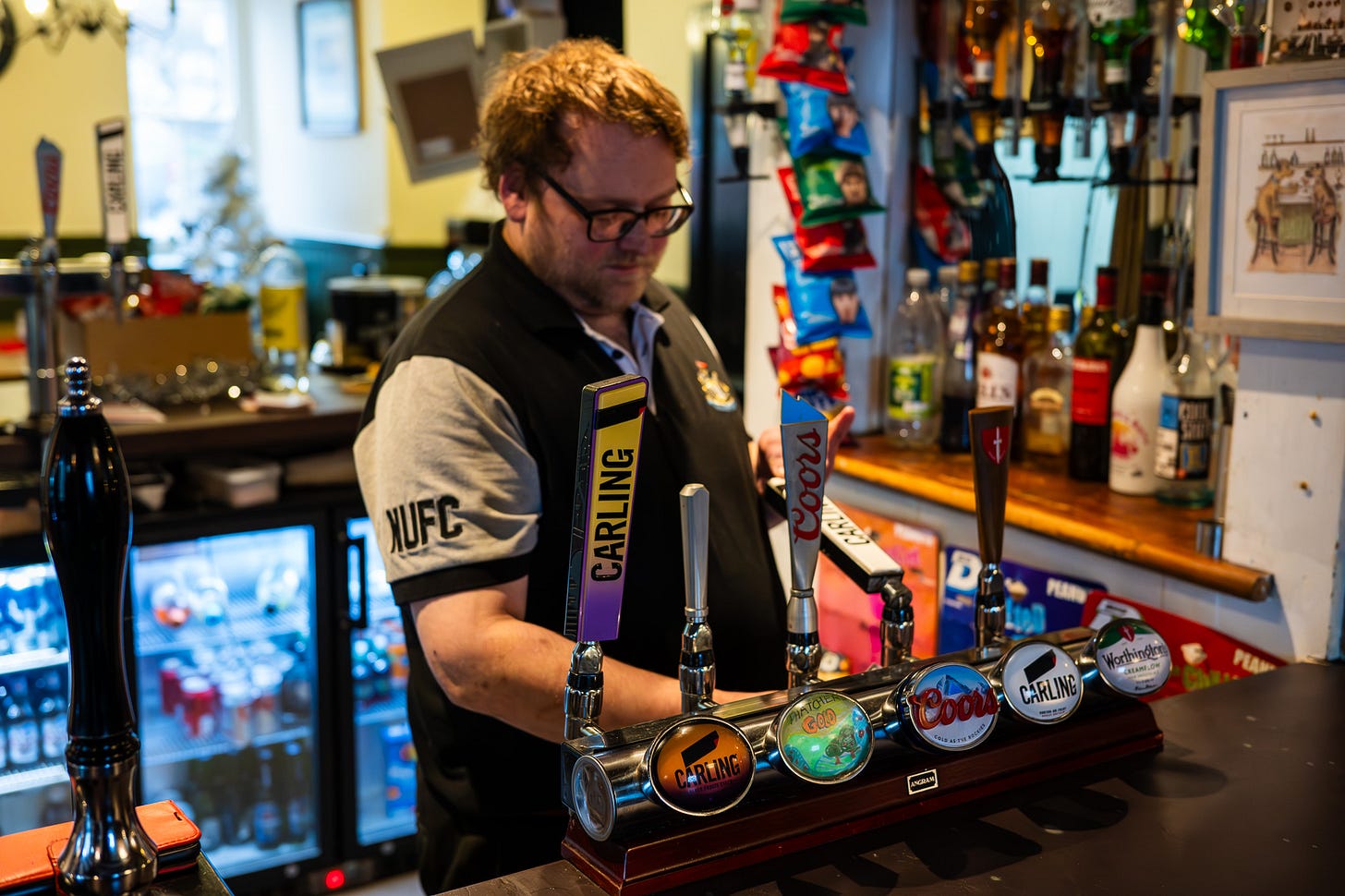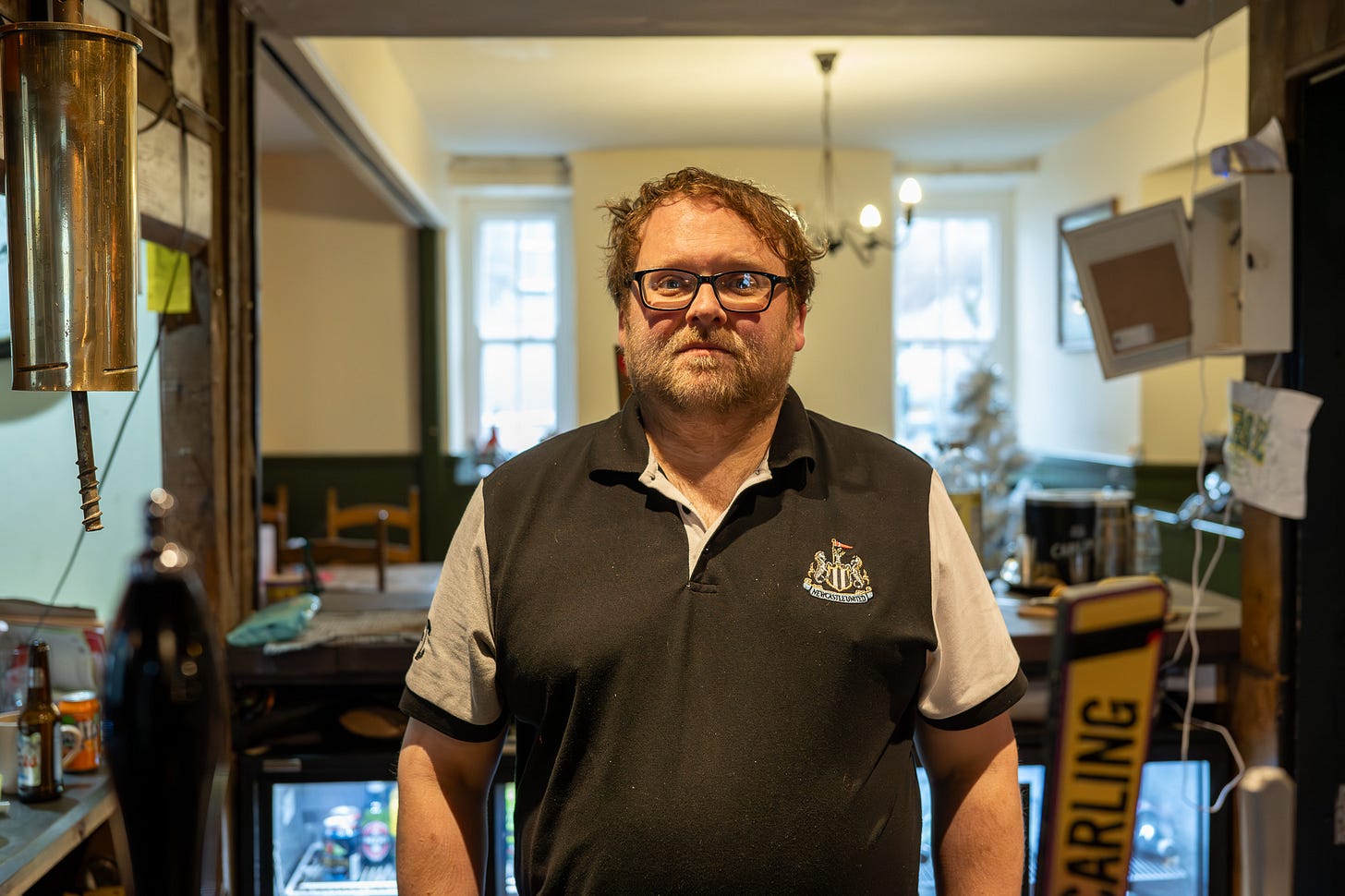"It's bloody hard. It's really, really hard," he said while pulling the pint of Carling.
When we met Peter, it was about 2 pm. We were on our way back from a short hillwalk, driving through the Welsh countryside in search of a pub. After a few dead ends, we passed by Y Gwydyr in Dolwyddelan.
It must have just opened. The pub was cold, but two small wood stoves were starting to show signs of life. Peter was scurrying around, taking chairs off the tables and getting set up for the day. He was kind, talkative, and probably surprised to see a couple of Americans in a remote pub on a chilly November afternoon.
We sat at the bar in search of a pint. Only Carling and Coors were on tap, since he doesn't keep any cask ales on during the winter. Plenty of bottles, though. And some cider. A pint of Carling it is.
After a few minutes of pleasantries, I asked him what it's like running a pub. "It's bloody hard. It's really, really hard," he replied. His answer caught me off guard. I didn't expect such an earnest reply straight away. In the United States, we feign happiness to hide anything resembling despair. But Peter was clearly eager to cut through the bullshit.
So what happened? What killed the pub?
The pandemic was at the top of his list. Everything changed after that. People stopped going out, forced closures, inconsistent regulation - things we’re all too familiar with now. Sure, some pubs got assistance, but the distribution was uneven and varied widely. Then came the soaring energy and food costs from the war in Ukraine. The entire pub-related supply chain got more expensive overnight. People and pubs racked up energy bills and debt to keep the lights on.
It was everything all at once, which feels like the refrain of the 2020s so far. Consumption patterns changed. They had to change. Why go to the pub and spend £6 for a pint when you can get a case from the grocery store?
A few minutes into the conversation, he reached down into the fridge, grabbed a Coors, and popped the cap.
After a few of these conversations, I imagine an obvious question is starting to percolate - why do it? Why run a pub? Why not just do something else?
The answer we want, the one we romanticize, is love. We imagine the friendly publican or innkeeper we see in films living this idyllic, peaceful life who gets enough fulfillment from pouring pints and giving advice to wayward souls. Or maybe being a publican is the family trade passed down for generations. They were born to do this, it’s in their blood.
And there might be some truth in that.
But the reality is much colder - it’s a job and there aren’t many other options. Peter has a wife and three kids. Dave from Eagle Ale House also has a family. What should they do, leave the pub and find a new gig? Where do they go? How exactly does one just change industries? And many publicans still live in the guest house above the pub, meaning they (and their families) would have to find a new home, too.
It reminds me of the discussion we have in the U.S. about jobs and industries that have been disappearing around the country for decades. There are failures on both sides - a failure to acknowledge that some of these jobs are better off gone, but also a failure to acknowledge that this kind of change is incredibly difficult and has generational impacts. These aren’t email jobs, moving widgets around on a screen, where we can copy and paste our way into another company, moving similar widgets around on a different screen.
We like to think of humans as adaptable, malleable creatures that can reinvent ourselves at will. And maybe we can, but only when we’re enabled to be the best versions of ourselves. We need the fundamentals: healthcare that won’t bankrupt us, education that opens doors, wages that keep up with living costs, access to high quality food, and housing that provides stability (to name a few). As these slip further out of reach for many, the ability to adapt becomes a luxury of the privileged few.
So maybe the better question is, should it be this hard to survive?
Note: This piece is adapted from my project, The Morning Tipple, which I’ll finally be archiving soon and it’ll only be available to paid members.







Id be inclined to say that if he serves Carling then it’s his own fault😂
Love this! I’m Harrison, an ex fine dining line cook. My stack "The Secret Ingredient" adapts hit restaurant recipes (mostly NYC and L.A.) for easy home cooking.
check us out:
https://thesecretingredient.substack.com